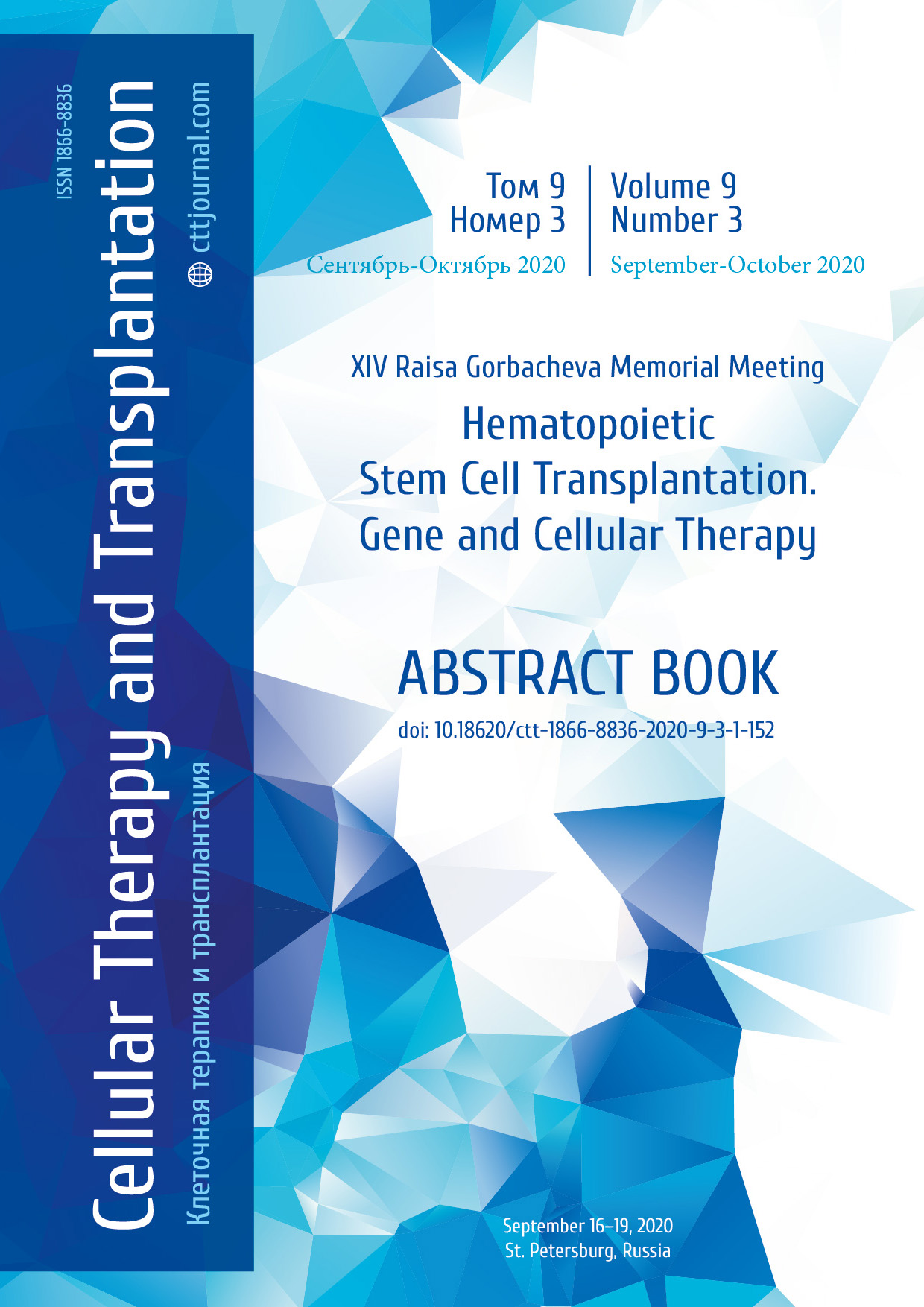PI-01. Bloodstream infections in allogeneic hematopoietic stem cell transplant recipients: epidemiology, risk factors and outcomes
Mobil I. Akhmedov, Galina A. Klyasova, Elena N. Parovichnikova, Larisa A. Kuzmina, Vera A. Vasilyeva, Mikhail Yu. Drokov, Mariya V. Dovydenko, Anastasia V. Fedorova, Natalia N. Popova, Zoya V. Konova, Feruza A. Omarova, Olga S. Starikova, Ulyana V. Maslikova, Ekaterina D. Mikhaltsova, Olga M. Koroleva, Anna A. Dmitrova, Darya S. Dubnyak, Valery G. Savchenko
National Research Center for Hematology, Moscow, Russia
Contact: Dr. Mobil I. Akhmetov, e-mail: mobilakhmedov@gmail.com
Summary
Introduction
Bloodstream infections (BSI) are a major cause of morbidity and mortality among allogeneic hematopoietic stem cell transplant (allo-HCT) recipients. The purpose of this study was to analyze the incidence, risk factors and the outcomes of BSI after allo-HCT.
Materials and methods
This retrospective study included 207 patients (50.7% females and 49.3% males) who underwent allo-HCT in the National Research Center for Hematology during the period from January 2018 till August 2020. Median age was 35 years (range 17-65). Matched related transplantations (MRD) were performed in 57 (27.7%) cases; matched unrelated (MUD), in 48 (23.3%); mismatched unrelated (MMUD), in 37 (18.0%); haploidentical, in 64 (31.1%). Fluoroquinolone prophylaxis was received by 97 (46.6%) patients with no extended-spectrum beta-lactamase producing bacteria obtained from rectal swabs. A single allo-HCT was performed in 193 (93.7%) cases; two or more, in 13 (6.2%). Engraftment failure was detected in 35 (17.0%) patients, and acute GvHD was documented in 53 cases (25.7%).
Results
A total of 88 (42.5%) patients developed BSI: 71 (81.0%) patients had only 1 episode, 17 (19.0%), two or more; overall number of BSI episodes was 111. Median time from allo-HCT until BSI was 13 days (range 0-283). One pathogen was isolated in 93 episodes (83.7%); two or more, in 17 cases (15.3%). Overall number of microbial isolates was 133: 78 (58.6%), Gram-negative bacteria; 54 (40.6%), Gram-positive bacteria, and Candida parapsilosis was isolated in 1 case (0.8%). The ratios of Gram-negative and Gram-positive bacteria rates were as follows: 57.0% (n=49), versus 43.0% (n=37) at the day 0 to +30; 63.6% (n=14), and 36.2% (n=8) over days +30 to +100; 75.0% (n=15), and 25.0% (n=5) by day 100 and later (p>0.05). Bloodstream isolates were represented by: Escherichia coli (28.6%, n=38), Klebsiella spp (15.0%, n=20), coagulase-negative staphylococci in 13.5% (n=18); Staphylococcus aureus, 6.8% (n=9); Enterobacter spp, 8.3% (n=11); Pseudomonas aeruginosa, 3.0% (n=4), Acinetobacter spp, 1.5% (n=2), others, 5.3% (n=7).
Stem cell donor type, GvHD prophylaxis strategy, time to neutrophil engraftment of >20 days, and engraftment failure on day +28 were significantly associated in univariate analysis with higher risk of pre-engraftment BSI, whereas donor type and acute GvHD correlated with post-engraftment BSI (Table 1). MMUD compared to MRD and time to neutrophil engraftment more than 20 days were significantly associated with the higher risk of pre-engraftment BSI in the multivariate model (HR=4.78; 95% CI 1.52-14.90; p=0.007 and HR=2.83; 95% CI 1.40-2.83; p=0.004 respectively), whereas MUD and acute GvHD correlated with post-engraftment BSI (HR=5.93; 95% CI 1.28–27.52; p=0.023 and HR=3.69 95% CI 1.42-9.52; p=0.007 respectively). The overall 30-day survival after BSI was 86.9% and no significant difference could be detected between Gram-negative, Gram-positive and polymicrobial episodes (84.0% vs 92.7% vs 81.3% respectively; p=0.375).
Table 1. Univariate analysis of pre-engraftment BSI risk factors

Conclusions
Gram-negative bacterial BSIs after allo-HCT prevailed in this study. The most significant factors of pre-engraftment BSI were MMUD transplantations and time to neutrophil engraftment of >20 days; MUD transplantations and acute GvHD were associated with higher risk of post-engraftment BSI. No significant difference in 30-day overall survival could be detected between Gram-negative, Gram-positive and polymicrobial episodes.
Keywords
Bloodstream infections, allo-HCT, risk factors.


